Aussie expats reveal new ‘Covid normal’ in Great Britain, Singapore, Germany and US
What does living with Covid really look like? From going out in crowds, to navigating the travel traffic light system, we asked four Aussie expats to share their everyday new ‘normal’.

World
Don't miss out on the headlines from World. Followed categories will be added to My News.
While NSW is counting down to ‘Freedom Day’, vaccinated Melburnians are enjoying some small concessions and Qantas has announced a plan for the return to international flights, Australia is still languishing well behind the rest of the world in adjusting to living with Covid.
In Britain and the US crowds are back at sporting events, restaurants are busy, theatres are opening and travel is back on the agenda.
But what does everyday life with Covid really look like around the world? What Covid habits can we expect to keep? And will we really feel free when lockdown is lifted?
As these internationally based Aussies explain, we will have to make mental as well as practical adjustments.
Got a news tip? Email weekendtele@news.com.au
SINGAPORE
Tom and Himashi Cameron moved from Naremburn to Singapore in 2016 with their daughters, now eight and six.
Life in Singapore has partially opened up since the population achieved 80 per cent vaccination, with workplaces operating at 50 per cent capacity.
Reopening with Covid
“We have both been working from home since March 2020 and can dine out in groups of five and visit other households,” Himashi Cameron says.
“All shops and movies are open and schools are face-to-face, although we have pivoted to having friends over to our place rather than catching up at the pub or restaurant.”
Singapore’s hard lockdown last April lasted for three months, and while since then there has been no lockdown, there have been different levels of social restrictions depending on the rate of community transmission.”
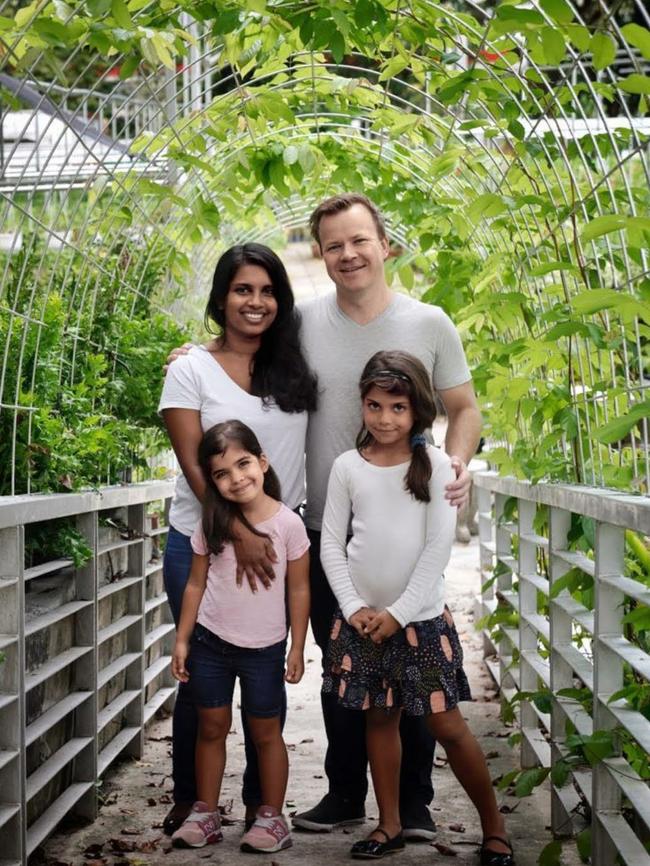
The rules
Since the pandemic, eight people has been the most they have been able to dine out with.
“Singapore has certainly adapted to a new normal,” Cameron said.
“Masks are mandatory outside unless eating, drinking or performing strenuous activity and everyone is required to log in (to premises) either via a phone or government issued token.
“You need to show your proof of vaccination to go to the movies or dine in a group larger than two.”
The travel bug
Living in Singapore and such a short flight to so many destinations, the couple’s travel pre-pandemic was constant.
“But since the pandemic started last year, our travel has stopped – our last trip was to Sydney in March 2020,” Cameron says.
“Just in the last week, Singapore started allowing vaccinated travellers to travel to Germany and Brunei without quarantine measures but since the pandemic, the only destination we have wanted to travel to is Australia to see our families, which has not been possible because Australia doesn’t have a quarantine spot available for our family of four.”
The mental change
“People are happy to have their freedoms back but there is an impatience for additional freedoms and international travel to resume. I think Covid is a worry that will be part of everyday life, and we will continue to be cautious until there is a suitable vaccination for children.”
Got a news tip? Email weekendtele@news.com.au
GREAT BRITAIN
Katherine Duffy moved to London in September of 2018 from Birchgrove in Sydney and says after an incredibly tough year, life
has settled into a new normal after final restrictions were lifted on July 19.
Reopening with Covid
“We are now able to have an unrestricted number of people in our house, you can hug your friends, you no longer have to isolate if you come into contact with a person who has tested positive, you are able to move freely within the country and we are able to travel abroad again,” the 29-year-old project manager for the Ministry of Justice, said.
“That being said, I am still encouraged to work from home and am required to fill out a risk assessment to go in (to work) and masks are required on public transport.
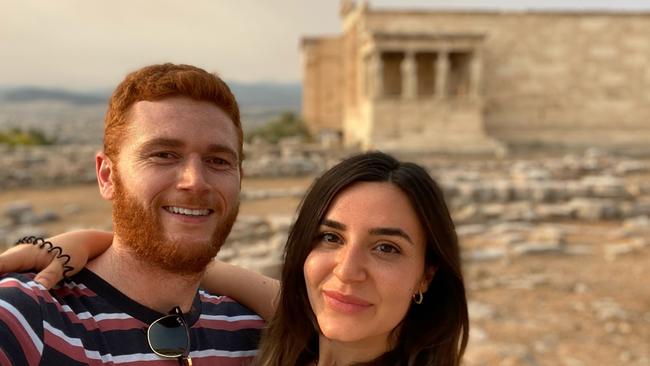
The rules
The UK’s shift of working from home remains strong, particularly in the public sector, but customers no longer have to sign in when entering shops. Wearing of masks is encouraged, but no longer mandatory.
“Mentally over the course of the pandemic it has been really challenging, particularly being so far from family,” Duffy said.
“I definitely slipped into periods of depression and would cry regularly.
“I am really close to my family in Australia so not knowing when I can see them again in the flesh has been taxing.
“My one wish would be to transport to Sydney, even just for a day, to give my mum a cuddle.
“(Here) I am fine to hug people I know and no longer worry about catching Covid from them because everyone I know is vaccinated.”
The travel bug
Travel is allowed but dictated by a traffic light system, with green, amber and red-listed countries, each with their own entry requirements.
“I just came back from Greece which is on the amber list,” Duffy said.
“As I was double vaccinated and had been for over 14 days I was able to enter Greece with proof of my vaccine which is through the NHS app on my phone.
“To come back into the UK, I had to fill out a passenger locator form, take a test up to 72 hours prior and then another test on day two of my return. I was not required to isolate because I am vaccinated and I was not returning from a red list country.”
The mental change
“Covid is no longer a worry, but it still lingers in my mind as it continues to be reported on. And despite all my friends being vaccinated, more people I know are catching it now than during the peak, however, (they are) not as badly affected, likening it to a heavy cold,” Duffy said.
“At the moment people are elated. It was so incredibly tough in the UK over the past year and particularly during the winter.
“The general consensus from friends is that we are all just burning through money at the moment, going out to dinner, to the pub and spending money on experiences to catch up on lost time.
“When things first lifted, it almost felt like I was suffering from agoraphobia as it was weird being out in public again surrounded by lots of people.
“When I was out I would feel slightly overwhelmed by the crowds then head home earlier than normal and felt an instant feeling of safety as I walked through the door.
“That sensation has definitely passed now.”
GERMANY
After six months of never-ending lockdowns, life in Germany is all but back to normal for Sydney expat Flip Byrnes after freedoms were granted gradually from May.
Byrnes and her young family moved to Germany temporarily when her partner’s mother became ill, and are still there 18 months longer than expected since Covid started.
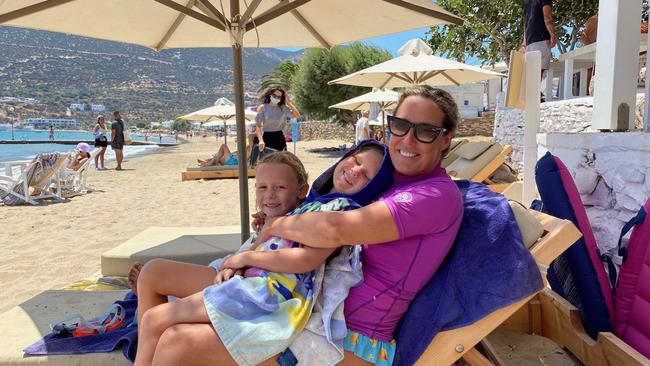
Reopening with Covid
From May outdoor dining on a terrace was allowed with an antigen certificate, diners had to be masked until seated, complete a written check in, remain seated with no movement between tables. Since then, things have improved to dining indoors, with no more sign-ins or antigen tests required.
“I think we’ve all learned things about ourselves – there have been many gifts inside the difficulties,” Byrnes said.
“Resilience, tolerance and empathy but I still keep the hand sanitiser at hands’s reach, feel uncomfortable on public transport and absolutely there is a physical touch lacking.
“We still greet each other with elbow bumps – if at all.”
The rules
Germans have been wearing masks since March last year in any indoor area including on transport and in supermarkets.
“And in our village they can’t be cloth masks, they have to be surgical masks – that’s very much part of normal life now,” mother-of-two Byrnes said.
“The bakery is still only two in the shop at a time and everywhere is still marked for social distancing.
“Last week the supermarket allowed entry again without a trolley for social distancing. Wheeling a trolley through a supermarket just to get a bottle of milk really got my goat for some reason, so I’ve appreciated that ending.
“All restaurant tables and shops have hand sanitisers but we’re out and about and I think everyone would do anything to have that happen, including (putting up with) wearing masks and any other measures.”
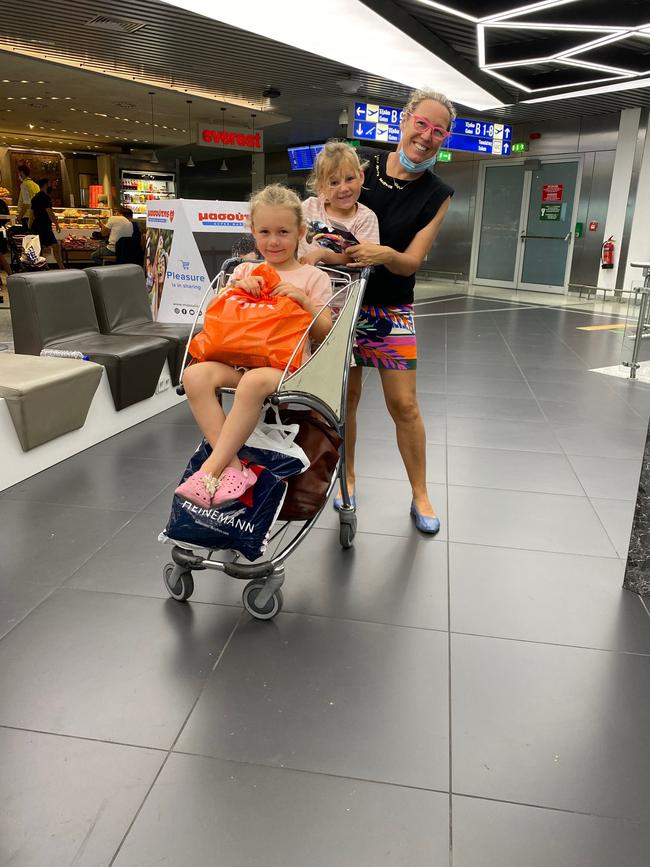
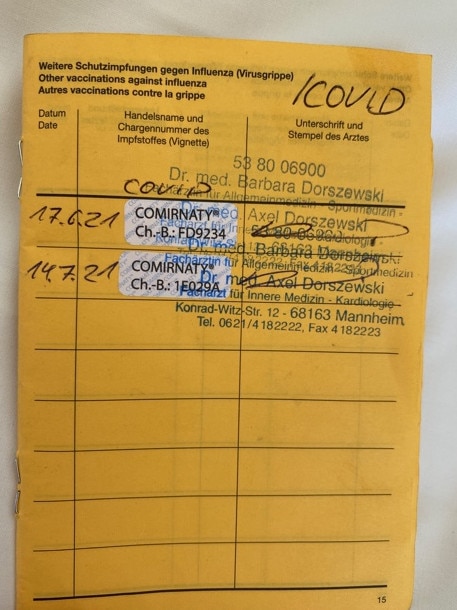
The travel bug
“I arrived on the Amalfi for British Vogue before even most of the hotels opened in May,” she said.
“Every country and airlines has different regulations. To board planes in Italy I needed only an antigen test with certificate, but to go on to Greece for the next assignment, it had just changed to a PCR test so I couldn’t board a connecting flight and ended up in Rome for two days as PCR tests take a minimum of 24 hours to process.
“Getting back into Germany requires quarantine from some countries, and that list changes daily, so I’ve accepted a work trip that starts in Spain next month, but am watching closely in case it goes on our red list.
“Most airlines and countries also require a digital form to be filled out – for Greece it needs to be midnight before the day of flying – so you have to be on top of individual rules as you get where you need to go.
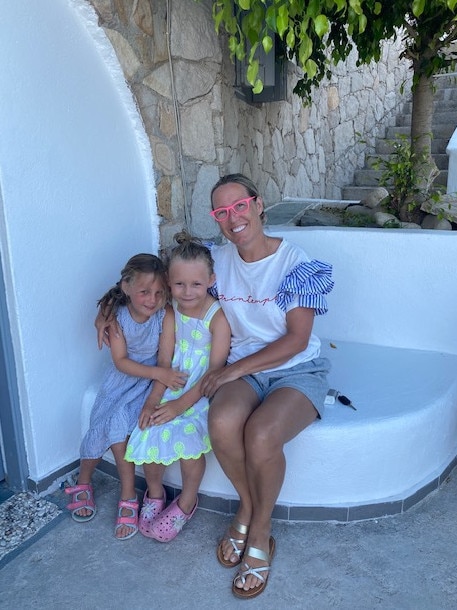
“Even if you have a vaccine passport, certain airlines still require those tests in addition.”
The mental change
After months confined to a small village, Byrne’s two days in Rome was like being on another planet.
“It was buzzing, people were out, enjoying life. It was like being in a movie scene after eight months
in a tiny village and it was also confronting.
“I ate super early at 7pm and was gone before the streets became busy.
“I also now pay to sit up the front of a plane on budget flights and board last as there is no social distancing on flights, so this is my own way to compensate that.
“Covid is still out there and it’s up to the individual how they want to manage travelling with that.”
With a fourth wave predicted to hit Europe, she said the pandemic is still a daily worry but at the moment, it is all about enjoying life.
“There’s a real feeling of make the most of every moment of ‘normal life’ and everyone was grateful after the winter just to be outside again and able to see and meet people,” she said.
“It’s also slightly surreal – the first time I was in a restaurant again was downright weird.
“I feel that we are six months ahead of Australia here in every way – vaccination rates and how Covid moves,” she said.
“The good news is that people at home can maybe see what’s ahead.”
UNITED STATES
Sydney’s Alex Savidis and his young family moved to the US in August 2020 to open new cafe, In Common NYC, in the city’s Hudson Yards – a passion project which was delayed a full year due to the pandemic.
Reopening with Covid
Alex and his partner Dana both caught Covid in January, suffering a bad flu and fatigue. Their two-year-old son didn’t get it, and Dana, who was eight-months pregnant at the time, gave birth to a healthy baby six weeks later, having a planned home birth to avoid Covid-filled hospitals.
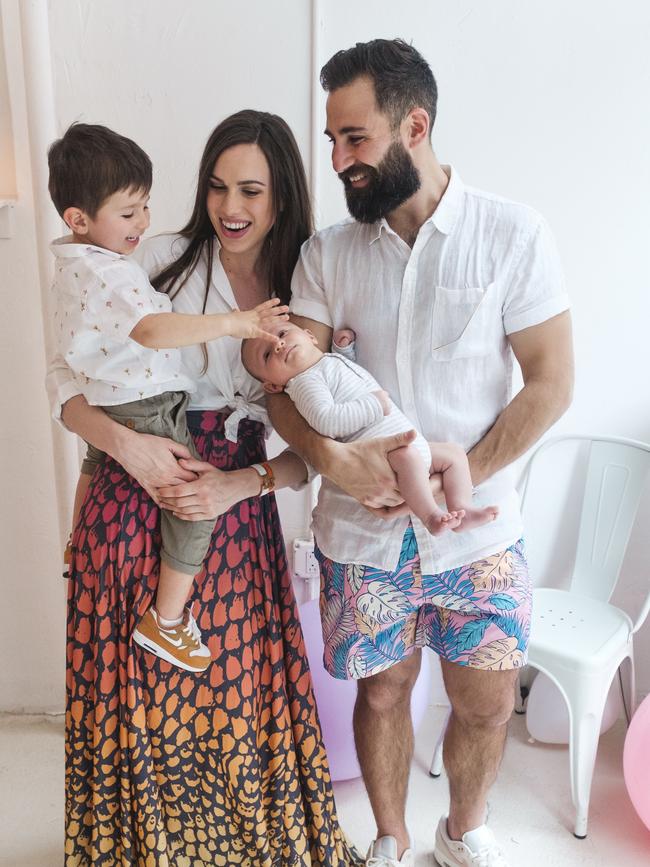
Life since then feels quite normal, Alex said.
“This summer everyone has moved back to the city, apartments are hard to find again and there’s a buzz about the city with people eager to get out and make up for lost time,” Alex said.
“The real change came entering summer 2021, when the city opened back up completely and it took some time after that before indoor dining was allowed at max capacity. Before that was only 10 per cent capacity.
“As a business owner, a lot of challenges came with supply chain issues with building materials and scheduling trades as well as some building restrictions in the earlier stages. We weren’t allowed more than six people working on site at a time.
“As of this week, we are required to check the vaccination status for indoor dining and we have procedures in place to make sure our staff and customers are healthy and safe.”
The rules
There is no signing in when entering establishments, though the current guidelines are that masks are required for unvaccinated people and optional for the vaccinated.
“In the supermarkets you’ll see a mix of people with and without masks and nobody is getting hassled for their personal decision,” Savidis said.
“Restaurants, bars and gyms all now require to ask for ID and proof of vaccination if anyone wants to go in and use the facility, otherwise outdoor dining is the option for unvaccinated people.
“Sporting events and concerts have been happening and people are attending those with proof of vaccination. Most people are still working from home. September was meant to be when the offices returned, though it’s now pushed back to January or February.”
The travel bug
“People can move around within the country freely – international travel requires a vaccine or negative Covid test before flying,” Savidis said.
“Many of my friends have had trips locally and internationally with no issues. Europe, South and Central America and the Caribbean have all been popular destinations.
“People are just living!
“You can quarantine when you come back or get a negative Covid test.”
The mental change
“I wouldn’t say it’s changed me, though I am conscious of other people and how they may feel with interactions. Greetings or meeting people is always an interesting awkward mix of failed handshakes, elbows or fist bumps because nobody is sure what to do or how the other party feels about it,” he said.
“The city making the most of life regardless of Covid. It’s definitely been a summer to remember for New Yorkers.”
Got a news tip? Email weekendtele@news.com.au




